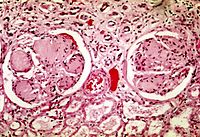
Photo from wikipedia
Background Limited data suggest serum chloride levels associate with mortality in heart failure, chronic kidney disease (CKD), and pulmonary arterial hypertension. Randomized trials have also shown that administration of crystalloid… Click to show full abstract
Background Limited data suggest serum chloride levels associate with mortality in heart failure, chronic kidney disease (CKD), and pulmonary arterial hypertension. Randomized trials have also shown that administration of crystalloid intravenous fluids with lower chloride concentration may have better renal outcomes. However, chloride has not been studied longitudinally for CKD progression. Methods We used a prospective cohort of subjects with stage 3 and 4 CKD recruited from a nephrology clinic at a single medical center. Linear regression, linear regression with generalized estimating equations, and Cox proportional hazards models were created for outcomes of overall change in estimated glomerular filtration rate (eGFR), longitudinal changes in eGFR, and time to > 30% decline in eGFR, respectively. Baseline chloride was modeled continuously and categorically, and models were adjusted for potential confounders. Results Median follow-up was 1.7 years. Baseline median age was 72 years and median eGFR was 35.7 mL/min/1.73m 2 . In multivariable analysis, higher serum chloride associated with worsened eGFR decline. Every 1 mEq/L increase in chloride associated with an overall eGFR decline of 0.32 mL/min/1.73m 2 ( p = 0.003), while the difference in eGFR decline in the highest quartile of chloride was 3.4 mL/min/1.73m 2 compared to the lowest quartile ( p = 0.004). No association between serum chloride and time to 30% decline in eGFR was observed in multivariable analysis (hazard ratio 1.05 per 1 mEq/L increase in serum chloride, p = 0.103). Conclusions In CKD patients, higher serum chloride associated with a modestly steeper rate of eGFR decline, and may be a useful biomarker to predict CKD progression. Further studies are needed to determine causality.
Journal Title: BMC Nephrology
Year Published: 2020
Link to full text (if available)
Share on Social Media: Sign Up to like & get
recommendations!